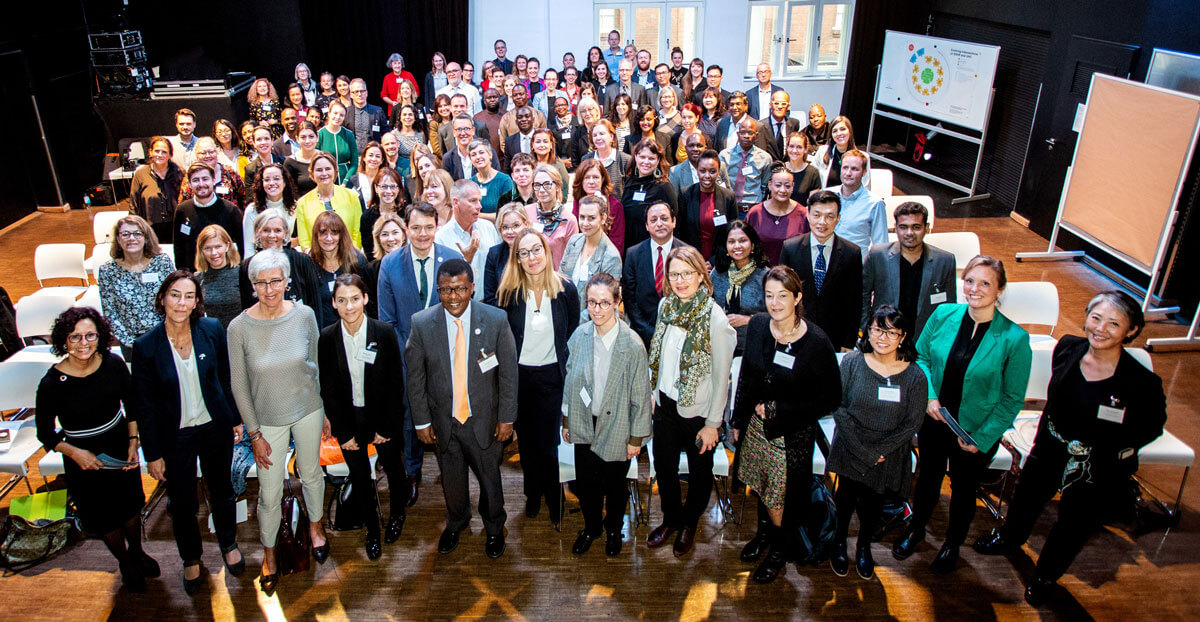The 17th International Dialogue on Population and Sustainable Development in Berlin
Making (and packing) the case for Nairobi
Experts call for stronger cooperation to ensure accessible sexual and reproductive health services for all

Especially women and girls are still denied access to essential and affordable health services. Additionally, the right to sexual and reproductive health (SRH) services becomes increasingly controversial. The two-day dialogue in Berlin (October 24-25, 2019) explored which steps can ensure that SRH becomes accessible for all people regardless of gender or financial means.
A crucial moment for global health
More than 100 delegates from 35 countries travelled to Berlin for the 17th International Dialogue on Population and Sustainable Development at a crucial moment in the global movement for health. Significant strides have been taken towards achieving Universal Health Coverage (UHC) – the equal access to quality, affordable health services without the risk of financial hardship. The event took place just weeks after the approval of a landmark Political Declaration on Universal Health Coverage at a UN High-Level Meeting in New York. Yet universal access for all is still a distant reality and a vital aspect of these services is under attack.
Sexual health and rights: a cornerstone of Universal Health Coverage
Delegates at the Dialogue stressed the fact that people’s SRH is a cornerstone of accessible and affordable health coverage for all. UNFPA´s Deputy Executive Director Dereje Wordofa described the continued disempowerment of women and girls’ and said sexual and reproductive rights must be addressed as part of a broader vision of universal health services.
The World Health Organization’s Lale Say said that help is available to support individual countries and health sectors in developing their health systems to move towards and sustain UHC and how to structure SRH services. UHC should “be supported by enabling legislation”, she explained, “and sexual and reproductive health should always be part of Universal Health Coverage”.
A call for unity and collaboration
Anneka Knutsson, Chief of the Sexual and Reproductive Health Branch at UNFPA, the co-host of the Nairobi summit, explained that ‘2019 has shown unprecedented pushback on sexual and reproductive health rights. So we must move from competing amongst partners to collaborating’.
Renate Bähr, Executive Director of Deutsche Stiftung Weltbevölkerung, called for faster progress and more cooperation: ‘We must unite in a common cause ... so that everyone can freely decide on their sexuality and have the family they want!’.
There was an overwhelming agreement that the movements for UHC and SRHR are interdependent. One cannot be achieved without the other. Delegates also underlined the need for experts from different thematic areas and sectors to cooperate more closely and to unite behind the goal of making health for all a reality.
‘You need people with a mindset of collaboration’. Frank Strelow, Bayer AG’s Vice President of Global Healthcare Programs, said that progress in offering SRHR services is dependent on the willingness to work together – both within the health sectors and together with the corporate sector.
The need for a people centred approach
‘Supporting UHC is an opportunity for politicians to stand up for equal human rights’ said Anders Nordström, Ambassador for Global Health at the Swedish Ministry for Foreign Affairs, re-focusing the discussion on the basic rights of the individual and on the importance of listening to people.
Delegates were clear about the need for a people-centred approach. Brian McKenna from the Reproductive Health Supplies Coalition said, ‘women must never simply be a user at the end of the supply chain’. While Ana Maria Bejar from the International Planned Parenthood Federation argued that ‘we have to start asking women what they want, rather than giving them what the State thinks they need’.
Invest now, not later
Annette van Edig from the German Federal Ministry for Economic Cooperation and Development (BMZ) underlined the cost-effectiveness of early investment - particularly in the field of family planning. ‘From an economic point of view...if you invest in a healthy life from the beginning for women and girls, you avoid many other costs.’
Messages for Nairobi
Delegates were asked to write their visions on a postcard and as the dialogue drew to a close, to place the cards inside a large black suitcase. This suitcase was presented to Dereje Wordofa of the United Nations Population Fund, who promised to deliver the messages to the Nairobi Summit in November. The Summit, which took place shortly after the International Dialogue, marked the 25th anniversary of the ground-breaking conference in Cairo in 1994 and attempted a decisive push on sexual and reproductive health rights. Furthermore, several participants of the 17th International Dialogue sent video messages from Berlin to Nairobi.
